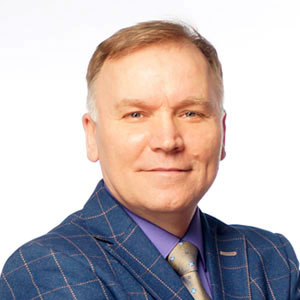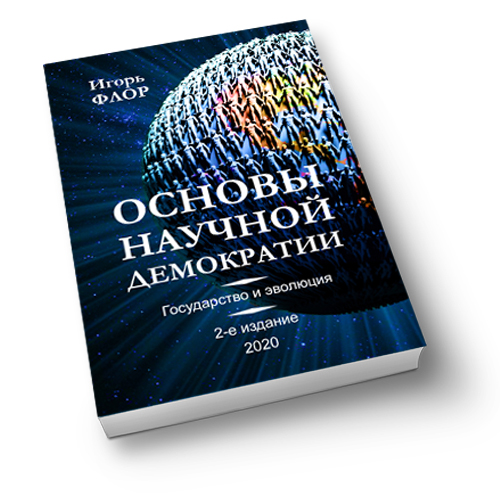
What is Scientific Democracy?
Scientific Democracy is a term that may refer to a theory or a political system. In the first meaning it is the General Theory of Democracy at the intersection of human and natural sciences. Its subject is a democracy as a phenomenon of the living nature (biological and social), and its tenets are true for any society regardless of ethnicity, race, religion, historical period etc. It is a synthetic theory that includes management and cybernetics. Its main aim is to establish the universal principles of effective democratic governance — the necessary basis of a Welfare State. As a political system Scientific Democracy is the highest stage of democratic evolution of society when the People's power is exercised on a scientific basis.
How does Scientific Democracy differ from traditional democracy?
Let us compare traditional and Scientific democracy in the following examples.
- Traditional democracy is a form of government in which the People has the power
- Scientific Democracy is a form of government in which the People not only has the power but also exercises it scientifically correct
- Traditional democracy is the People's governance
- Scientific Democracy is the People's governance performed in accordance with the laws of management theory and cybernetics
- Traditional democracy is the People's power exercising
- Scientific Democracy is the scientific approach to the People's power exercising
The comparison shows that unlike traditional democracy, which mostly focuses on establishing the People's governance, Scientific Democracy specializes in the People's governance efficiency. This is because the People's governance as any other process of management may be inefficient. That is why, the main goal of Scientific Democracy is to ensure that the People gets the maximum possible public good from using its (the People's) constitutional status of the source of power and holder of sovereignty. So, we can conclude that the goal of traditional democracy is to ensure that the People rules, while the goal of Scientific Democracy is to ensure that the People rules as effective as possible.
Why is effectiveness so important?
If we suppose that the People really possesses the power, then this fact being alone does not yet guarantee that the power is used correctly or effectively and the society is developed normally. Even the most united People, thinking and acting as a single whole, is still just a living organism, and, as any man, it is prone to error. Suffice it to recall, for instance, the tragic fallacy of the German People who believed in the theory of his superiority to other nations in the 30s of the last century. Or we could recall the fallacy of the Soviet People who lived in conditions of a totalitarian regime for more than 70 years, and believed that a communism was coming. In both cases, a delusion led the People to a total collapse. In terms of economics, a State went bankrupt because the People's governance was inefficient. And that is not an accidental coincidence, but a general law of nature that works not only regarding the State or a business, but also regarding any living organism. In the living nature all ineffective behavior of organisms is eliminated by natural selection. The same thing happens to ineffective activity of a private business: it is eliminated by natural selection of the free market. Fair competition forces private companies to turn to research and development, introduce new methods of management and innovations. The Business Conduct Guidelines of SIEMENS Corporation says:
Fair competition is in line with our values: excellent, innovative, and responsible. SIEMENS stands for fair competition in which only market economy criteria (quality, price, innovation, service, etc.) are the decisive factors for business decisions. Competition should not be distorted by unfair methods or means.
Introducing advanced technologies, methods, and innovations into social systems is like an evolutionary development of species in the living nature. As a result of this process, in private companies, like in living organisms, more effective management systems objectively get formed. The State is another thing: as a natural monopoly it does not participate in competition very much, and so it evolves extremely slowly, and sometimes may not evolve at all. Fair political competition intends to solve this problem, but due to inefficient People's governance system a nation fails to organize a fair emulation between the leading political opponents and protect the People from collusion of corruptive officials. The class of officials adapts to falsification of competition, free elections, and other democratic institutions. As a result, the State not just falls behind in its development from the other part of the society, it begins degrade and corrupt from inside. Eventually, this disease invades the whole national organism.
Scientific Democracy as effective remedy against corruption
There is a correlation between efficiency of the People's governance and the level of corruption in the public sector. The higher the efficiency is, the lower the level of corruption is, and vise versa. So, the lower the efficiency is, the greater the loss from corruption the People suffers. Therefore, if a People wishes its State prosperity, not bankruptcy, it must seek to bring its (the People's) governance process in line with the principles of management science, because the goal of the management theory is to secure maximum possible efficiency of any socio-economic system. Extending the management laws to the formal relationship between the People (the subject of control) and the State (the controlled object) is one of the most important tasks of Scientific Democracy.
If you got interested in Scientific Democracy, and would like to study it, I recommend you to start from its sociological foundations.
The Organic Concept of Democracy
The Scientific Democracy concept was developed on the basis of the Organic Theory of Society, from which, in its time, the doctrine of socialism and science of sociology descended. Therefore, one can well call Scientific Democracy the Organic Theory of Democracy. However, it is important to emphasize that we are talking here not about the classical, but modern version of the Organic Theory of Society, which is a synthesis of the classical and recent version that has been created and developing by the contemporary scientists through the method of comparative analysis of socio-economic and biological systems. Here is one example. Professor at the Political Science Department of the University of the Fraser Valley (Canada) Tyler Chamberlain in his book "Political Ideologies and Worldviews" (2021), in the Chapter "Organic Theory of Society and the State" writes on modern conservatism:
Politicians and political theorists often use terms like "body politic" or "social body." Classical conservatives take this idea very seriously and think of the State as being like a living organism. A political society can be healthy or sick, just like a living organism, and the preservation of social health is of the utmost importance to conservatives.
Let us make a short retrospective journey into history to show how sociology was born and what role in that process the Organic Theory of Society played.
The Origin of Sociology
The ground, on which sociology appeared and grew up, was mostly prepared by philosophers of the age of Enlightenment and early socialists. French philosophy dominated in that process because France, having gone through two revolutions, had been living through the greatest social and political transformation in its history. Under monarchy, biological personality and will of a monarch were identified with personality and will of the State, which secured relative stability and order. But when monarchy was eliminated, and the power, formally, was handed over the People, there arose a demand in a new scientific theory, which could prove existence of the People, and its having all necessary properties such as personality and will so that it (the People) could fulfil the role of the sovereign. It was all the more urgent that in practice the constitutions declaring the power of the People in the name of the People itself began to appear. For example, the Constitution of the United States begins with these words: "We the People of the United States ..." Therefore, the People, de-jure, already acted as a subject of law, i.e. as a person endowed with supreme power instead of the monarch. If this is not a global falsification, not a fraud, if the People really exists, and can fulfil the functions of the ruler, then a special science is needed that could provide objective data to prove that.
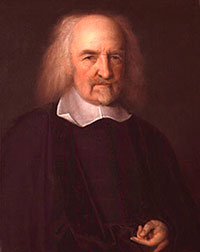
Thomas Hobbes
In that circumstances, many philosophers turned to the Organic Theory of Society the scientific community of that time knew well not only by the works of the ancient Greek philosophers, Plato, Aristotle, and others, but also philosophers of the modern era such as Thomas Hobbes (1588 — 1679). In his famous treatise Leviathan or The Matter, Form and Power of a Commonwealth Ecclesiastical and Civil (1561) Hobbes created an image of a State as an artificial man of a huge size whose body consisted of people but at the same time was designed similar to a biological body of an ordinary man. He called that image with the name "Leviathan" he adopted from the Bible where Leviathan was the name of a huge sea serpent. It so happened that the prerequisites for appearance of sociological science were, mostly, created in the beginning of the 19th century by a French philosopher, social reformer, creator of his own political and economic ideology known as Saint-Simonianism, Henri de Saint-Simon (1760 — 1825). As a young officer of the French army Saint-Simon participated in the war for independence of the North American colonies against Great Britain under George Washington command. He got taken captive by the English, then got freed at the end of the war, and returned to France. He saw his mission in helping French society to free from absolutism and become an industrially developed thriving republic. He generated many social ideas, including, worked on improvement of the Organic Theory of Society.
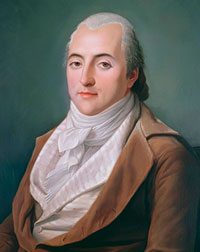
Henri de Saint-Simon
For instance, his concept of Social Physiology (fra: Physiologie Sociale) is well known. Within the concept he compares organs of society, their structures and functions, to those of a biological organism. In the essay On Social Physiology (fra: De la physiologie sociale, 1813) he writes:
Physiology is not only the science which, penetrating inside our organs with the help of anatomy and chemistry, aims to reveal their inner tissues, to better understand their functions ... general physiology is involved in considerations of a higher order, it towers above individuals, who for it are nothing but organs of the social body, whose organic functions it must study, just as specialized physiology studies those of individuals.
Saint-Simon's teaching speeded up development of socialist ideas, in particular, had a great influence on Marxism.
One of the Saint-Simon's disciples, who later became his personal secretary and co-author of many works, Auguste Comte (1798 — 1857), went down in history as the father of new science — sociology. It was he, who coined the term sociology (fra: sociologie), in which "socio" — from Latin word "societas" (eng: society; fra: société) and "logie" — from Greek word "logos" (study, science). It should be said that it took Comte some time to invent the term. It appeared as late as in the lecture 47 of his Course of Positive Philosophy (fra: Cours de philosophie positive), written approximately in 1838. For a long period of time, more precisely, for about 17 years, Comte had used another term, Social Physics, in the meaning of "system of knowledge about society", that looked like the term Social Physiology used by Comte's teacher, Saint-Simon.
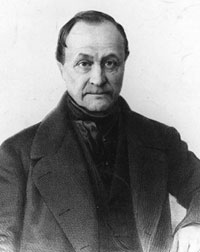
Auguste Comte
However, in 1835 he suddenly learnt about using the term Social Physics by another author (Adolphe Quetelet) with another meaning, and had to invent a new term. Comte saw some advantages in transfer to the term sociology. First, it consisted of one word, which was very comfortable to use. Second, it allowed Comte to separate his science from Saint-Simonianism. Finally, it was consonant with the term biology, which emphasized relationship of social science with the science of life. The latter was extremely important for Comte because he saw his mission in giving the world objective science of society, within which there would be solved the most important scientific task — to formulate a new theory of society as a real whole, similar to a biological organism, and to use the methods applied in the natural sciences, first of all in biology, to study social phenomena.
Many outstanding scientists of that time supported Comte's ideas. Among them are: an English philosopher, political economist, and civil servant John Stuart Mill (1806 — 1873), an English philosopher, psychologist, biologist, and sociologist Herbert Spencer (1820 — 1903), a German philosopher, economist, and sociologist Ferdinand Tönnies (1855 — 1936), and many others. A great contribution to sociology was made by Herbert Spencer. As experienced evolutionary biologist he enriched Comte's sociology with qualitative comparative analysis of social and biological systems, and influenced on promoting and fixing the term sociology in the official terminology of scientific community and popularizing the new science in the world.
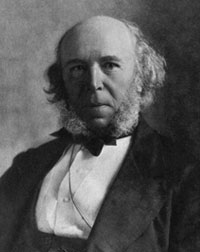
Herbert Spencer
A leading French sociologist Émile Durkheim (1858 — 1917) wrote classical works on sociology, for instance, The Division of Labour in Society (fra: De la division du travail social, 1893) and developed important concepts such as the Social Solidarity concept, the main source of which he considered the social division of labour. It is division of labor what, in his opinion, creates solid sustainable relations between people. And, what is more important, the social division of labor has natural roots because of being the direct continuation of much more ancient biological forms: differentiation and specialization. On top of everything else, Durkheim secured recognition of sociology as a full academic discipline by the official system of education of France. In 1895, he founded the first European department of sociology at the University of Bordeaux, and became the first Professor of sociology. In 1898, he founded the first French social science journal The Sociological Year (fra: L'Année Sociologique). The main merit of Durkheim is considered the fact that he brought sociology to the modern academic standards. Besides Saint-Simon, Durkheim also considers Charles de Montesquieu (1689 — 1755) and Jean-Jacques Rousseau (1712 — 1778) among those who contributed to formation of sociology. For details see his works: Montesquieu's contributions to the formation of social science (fra: La Contribution de Montesquieu à la constitution de la science sociale, 1892) and Montesquieu and Rousseau : forerunners of sociology (fra: Montesquieu Et Rousseau Précurseurs de la Sociologie, 1960).
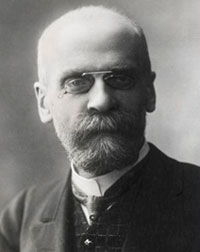
Émile Durkheim
I mentioned just a few key figures participated in formation of the fundamentals of sociology. Of course, within this article, it is impossible to tell about all scientists–proponents of sociology as the Organic Theory of Society. There have been a great many of them, and among them there have been large historical figures such as the founding fathers of Marxism: Karl Marx (1818 — 1883) and Friedrich Engels (1820 — 1895), as well as the founder of the first socialist State, The Union Of Soviet Socialist Republics (USSR), Vladimir Lenin (1870 — 1924). In 1894, Lenin wrote a work What the "Friends of the People" Are and How they Fight the Social Democrats (A Reply to Articles in "Russkoye Bogatstvo" Opposing the Marxists). Here, defending Marxism, including its stand on sociology, he, in particular, explains:
What Marx and Engels called the dialectical method — as against the metaphysical — is nothing else than the scientific method in sociology, which consists in regarding society as a living organism in a state of constant development (and not as something mechanically concatenated and therefore permitting all sorts of arbitrary combinations of separate social elements), an organism the study of which requires an objective analysis of the production relations that constitute the given social formation and an investigation of its laws of functioning and development.
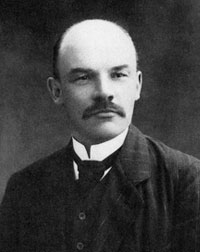
Vladimir Lenin
Scientific Democracy as a synthetic theory
So, according to the said above, sociology has the natural science basis through the Organic Theory of Society. Society is a social form of life, therefore, only integration with the science of life (biology) is what makes sociology able to generate objective knowledge of society. But if it loses the relation with its biological roots, so to say, gets out of touch with life, it inevitably turns into a pseudoscience of mechanical type, suffering from being subjective, demagogic, speculative. When it is based on nothing but statistics, results of which is easy to get falsified, and interpretation gets deformed to fit to needs of a customer, sociology often turns into a tool of public opinion manipulation. But democracy as a social phenomenon should be the subject of an objective science. The Theory of Democracy — the science of the People's power — has a vital meaning to society. However, the traditional democratic theory can not be an objective science unless it rests on the Organic Theory of Society. Such a science is closed in the vacuum of social reality, and so is pure speculative or normative.
Scientific Democracy, on the contrary, is the Organic Theory of Democracy that is a synthesis of human (sociology, economics, law) and natural (biology, physiology, psychology) sciences. Thanks to integration of human and natural sciences, Scientific Democracy, by nature, is the General Theory of Democracy. It is directly related with the science of life. It sees the People as a real living creature, a social person with a body and will, posessing identity and selfconsciousness, sense of justice, conscience, self dignity, instinct of self-preservation, ability to feel pain and pleasure. Therefore, being a living creature the People is a subject of public law who posesses natural inalienable rights, for instance, the right to self-determination, to a safe and dignified life, to protect its honor, dignity, and property, and of course, the right to fight for its life in case of a real threat to health and life. Though, the latter is rather not a right, but a duty to fight for life by any means necessary, like all living creatures do. That means not only to fight a war on a foreign enemy, occupationist, invader, but also resist an inner enemy, dictator, tyrant, usurper, up to all-people's uprising. It is not for nothing that the Declaration of Independence of the United States of America (1776) says:
When a long train of abuses and usurpations, pursuing invariably the same Object evinces a design to reduce them under absolute Despotism, it is their right, it is their duty, to throw off such Government, and to provide new Guards for their future security.
The Declaration of the Rights of Man and Citizen of French Republic (1793) contains a similar thought:
Quand le gouvernement viole les droits du peuple, l'insurrection est, pour le peuple et pour chaque portion du peuple, le plus sacré des droits et le plus indispensable des devoirs (When the government violates the rights of the people, insurrection is for the people and for each portion of the people the most sacred of rights and the most indispensable of duties).
Those natural rights of the People are undisputable. The People simply has them, from God, from Nature. Ignorance or disrespect of those rights inevitably leads to organized violence against the People: oppression, duping, injury to health and property. The People, like any human, needs constant protection of its rights.
The People as the personality of a social organism
The general principle of holism that was formulated by Aristotle in the Metaphysics — the whole is more than the sum of its parts — applies equally to both a biological organism and society. In his well known work The Rules of Sociological Method (fra: Les Règles de la Méthode Sociologique, 1895) Emile Durkheim writes:
La société n'est pas une simple somme d'individus, mais le système formé par leur association représente une réalité spécifique qui a ses caractères propres (Society is not the mere sum of individuals, but the system formed by their association represents a specific reality which has its own characteristics).
That specific reality of society, with its own characteristics, that every living organism bares, is the personality, the nature of which is impossible to reduce to the nature of the body or any of its parts, and that social personality is the People. Article 7 of the French Republic Constitution of 1793 states that "the sovereign People embraces the whole of French citizens."
The People as a person at public law
Since the People is the physical (natural) personality of a social organism, it can possess legal personality, that is to be a holder of rights and duties in public law environment. That is why in legal systems of developed democracies the People possesses personality at Constitutional law. A People, like any other living creature, has needs that must be satisfied. Since a People is a social, not biological, individual, its needs are of public nature. It means to sustain life a People needs a public product, which is often called "common good" or "public good." Therefore, one of the fundamental rights of a People is the right to create its own enterprise to produce public good. Such an enterprise is called "the State."
One of the proven tenets of Scientific Democracy is the one on the State's legal form of organization, according to which the State, de-facto, is a public-law nonprofit organization, enterprise, publicly funded institution, juridical person, created by the People with the aim of producing public good. Therefore, if the People is the natural person of a society, then the State is the juridical person of the People. When the State is officially created, the People automatically gaines the status of its founder together with the corresponding rights and duties. Since the State is a public institution it doesn not own any property or funds. Therefore, the People transfers its property to the State in operative administration and undertakes an obligation to fund the State's activity.
The People as a subject of management
The main function of the founder is managing the enterprise he has created. The general law of economics works in this field. By force of that law ineffective managing inevitably leads to bankruptcy of the enterprise. Therefore, if a People manages its State ineffectively, the latter inevitably comes to bankruptcy (default), and the People goes bust. In order not to let that happen, the People's governance must be effective. So, we have returned to what we said at the beginning of the article: "the goal of traditional democracy is to ensure that the People rules, while the goal of Scientific Democracy is to ensure that the People rules as effective as possible."
Scientific Democracy and cybernetics
Being the General Theory of Democracy, Scientific Democracy includes the General Theory of Management — cybernetics. According to the definition of the father of cybernetics, American mathematician Norbert Wiener (1894 — 1964):
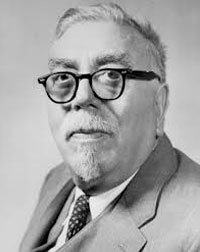
Norbert Wiener
Cybernetics is a science of general principles of control and communication in animals, machines, and social systems.
So, we know from cybernetics that, first, there are the general laws of management, which are common for living organisms, machines, and society, and second, biological organisms, evolving billions of years, have a lot more effective management systems than any social systems we have today.
Cybernetics is of a great scientific and social value because, in the applied aspect, it allows to transfer the principles of effective management, working in the living nature, to any social systems or organizations, including the State, which secures their evolution. Also, thanks to cybernetics it becomes possible to extend effective management models, successfully working in the private sector, to the public sector.
Scientific–Democratic Reform
To improve the People's governance system, which is usually refered to as the democratic governance system, make it maximum effective, it requires a unique complex reform that I call the Scientific-Democratic reform. The main task of the reform is to bring the national public law, especially that part of it, which regulates the People's governance order, in accordance with the generally recognized standards of management. Doing this we should keep in mind that in the "People – State" system the People is the supreme subject of management, while the State is the controlled object. The main goal of the reform is to improve effectiveness of the democratic governance system, and so to provide the necessary conditions for development of a Welfare State, that is a State that prodices plenty of public good of a high quality. Such a State can provide legal, economic, social security, as well as a high quality of life of the People over the long run.
Implementing such a reform is not easy, even if we do not cosider the resistance from the criminal community's side. To carry it out it will not be enough to gether a team of the world-class specialists or get the executive and legislative power. Most of all, it will require a total support of the People. The People should realize that its life will dromatically change. Literally, in a few days the People will turn into a full owner of the State and have to fulfill the functions of the owner not on paper but in practice, in real life. It means to regularly make life-changing decisions and bear full responsibility for them. Therefore, the Scientific Democrats are interested in public enlightenment, improvement of level of general education, development of science and culture, and most of all in the field of management.
Inevitability of Scientific Democracy
It should be said that Scientific Democracy is destiny of all Peoples of the world. All countries sooner or later will come to Scientific Democracy either evolutionary or revolutionary way. To be more exact, this process has already been going for a long time. It happens objectively by force of the fundamental laws of evolution, since natural selection favors those nations who, this way or another, obtain scientific-democratic properties. Those countries objectively become more competitive than otheres; they regroup the world capital for their own benefit, and constantly invest in further improving their competitiveness.
At the beginning of the article we defined Scientific Democracy as the General Theory of Democracy, and that was absolutely correct. But, taking into account all we said in the article, we can add that together with that definition the following ones may well fit:
- The Organic Theory of Democracy
- The Synthetic Theory of Democracy
- The Evolutionary Theory of Democracy
- The Managerial Theory of Democracy
- The Cybernetic Theory of Democracy
- The Sociological Theory of Democracy
This ends the article. If you know how to improve it, please, feel free to share your ideas with the author at scientificdemocracy@gmail.com. Contribute to the scientific democracy concept and become a co-author of the article!
If you would like to read the full research (Russian language only), please, get my book The Principles of Scientific Democracy (2020) here.
The author of the article:
Igor Flor
Important!
The book The Principles of Scientific Democracy has been translated into English, and the manuscript is ready to publish. The author would like to publish it in the United States, but it is hardly possible to do at the moment because of the sanctions: he is a Russian citizen. Nevertheless, he is looking for a partner, preferably an American scientist who could proofread the manuscript, write the foreword, and possibly help to publish the book despite the sanctions. So, if you are a native English speaker, preferably a USA citizen, specialist in social sciences, and is interested in cooperation, please, contact the author at: scientificdemocracy@gmail.com

